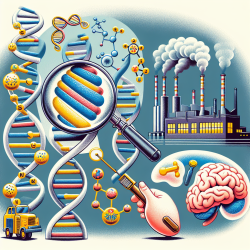Introduction
Classic galactosemia, a rare genetic disorder characterized by a deficiency in the enzyme galactose-1-phosphate uridylyltransferase (GALT), poses significant challenges for affected individuals, particularly children. Despite dietary interventions, complications such as neurological impairments and speech disorders are prevalent. The recent study, "The natural history of classic galactosemia: lessons from the GalNet registry," provides valuable insights into the progression of this condition and offers a data-driven foundation for enhancing therapeutic approaches, particularly in speech therapy.
Understanding the GalNet Registry Findings
The GalNet Registry, a comprehensive database encompassing data from 15 countries and 32 centers, has provided an extensive dataset on 509 patients with classic galactosemia. Key findings from the registry highlight that despite early dietary interventions, a significant proportion of patients experience developmental delays, particularly in language and speech. Specifically, 66.4% of patients reported language and speech disorders, with 41.0% experiencing speech defects and 40.6% facing vocabulary impairments.
Implications for Speech Therapy
For speech-language pathologists (SLPs) working with children diagnosed with classic galactosemia, these findings underscore the importance of early intervention and individualized therapy plans. Here are some strategies that practitioners can consider:
- Early Screening and Intervention: Early diagnosis through newborn screening (NBS) has been associated with better outcomes. SLPs should advocate for early screening and initiate therapy as soon as possible to mitigate the impact of language delays.
- Customized Therapy Plans: Given the variability in speech and language impairments, therapy should be tailored to the specific needs of each child. Utilizing data from the GalNet Registry can help in predicting potential challenges and customizing interventions accordingly.
- Multidisciplinary Approach: Collaboration with other healthcare professionals, including pediatricians and dietitians, is crucial. Understanding the dietary restrictions and their impact on cognitive development can inform more effective therapy strategies.
- Parental Involvement: Educating parents about the condition and involving them in the therapy process can enhance outcomes. Providing resources and strategies for at-home practice can reinforce skills learned during therapy sessions.
Encouraging Further Research
While the GalNet Registry offers a robust foundation for understanding classic galactosemia, continued research is essential. Practitioners are encouraged to contribute to and utilize registries like GalNet to track patient outcomes and refine therapeutic approaches. Further studies could explore the long-term efficacy of different speech therapy techniques and the role of dietary modifications in cognitive and speech development.
Conclusion
Incorporating insights from the GalNet Registry into speech therapy practices can significantly enhance the quality of care for children with classic galactosemia. By leveraging data-driven strategies and fostering a collaborative approach, SLPs can improve language and speech outcomes, ultimately contributing to better overall quality of life for these patients.
To read the original research paper, please follow this link: The natural history of classic galactosemia: lessons from the GalNet registry.










